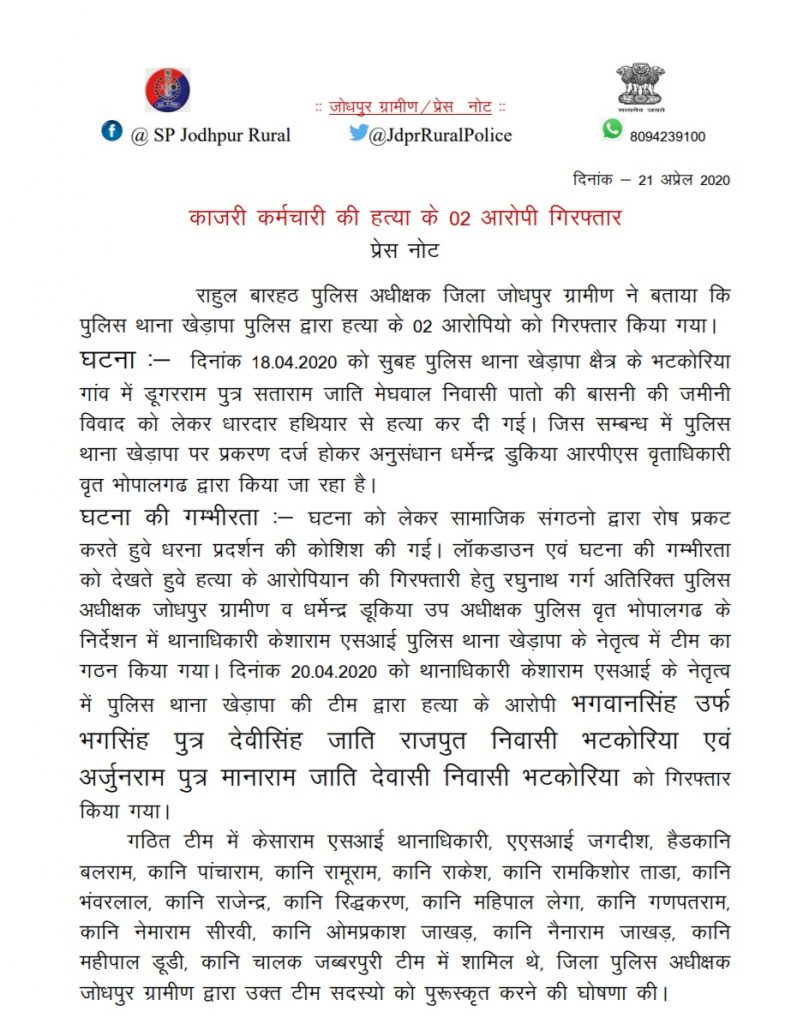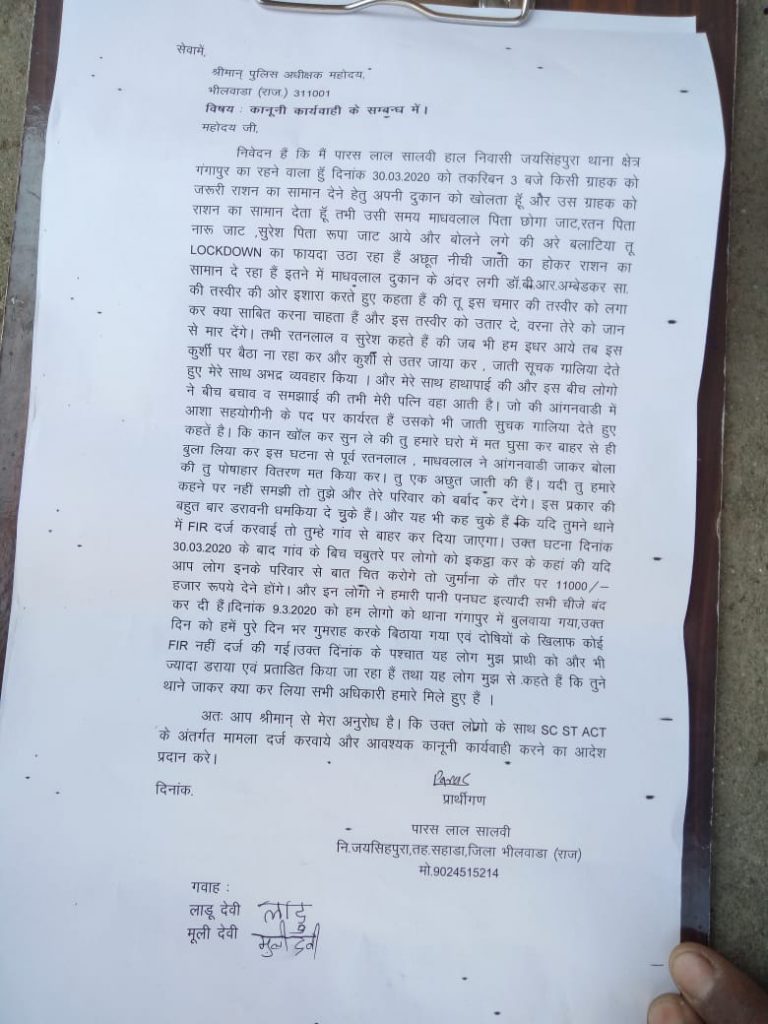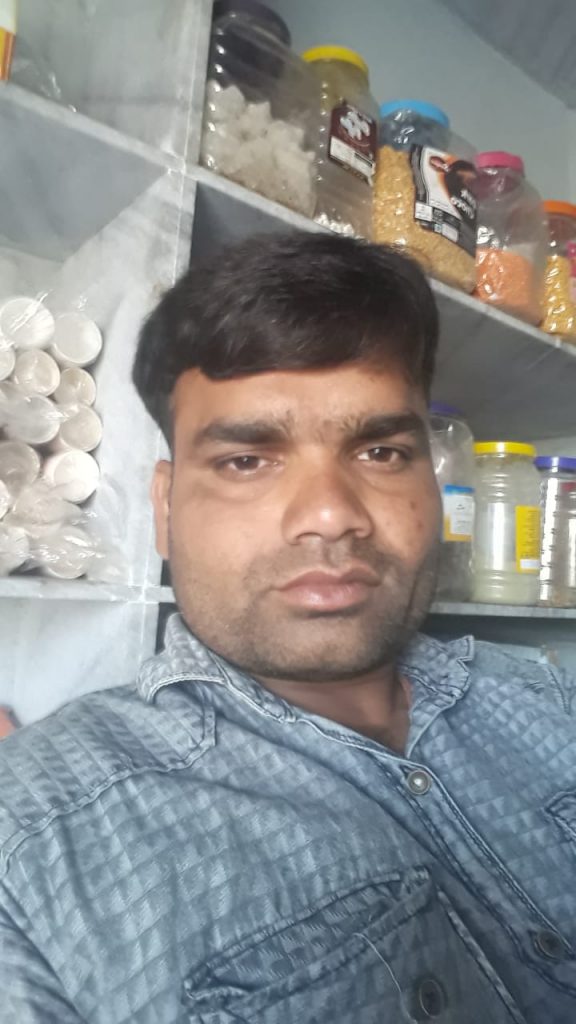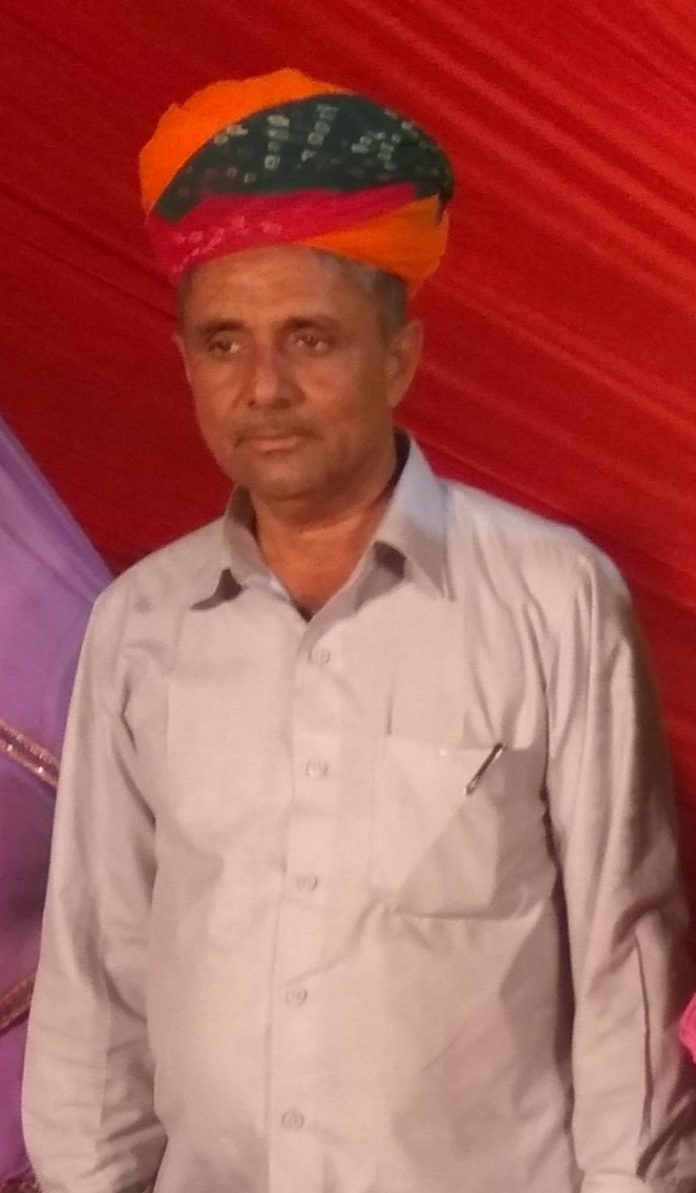In spite of the ongoing country wide lockdown in India, enforced by the government to contain the COVID-19 pandemic, caste based violence reared its ugly ahead in Rajasthan with a killing of a middle-aged Dalit man allegedly by upper-caste men. TwoCircles.net correspondent NAZISH HUSSAIN writes on the crime and the devastating impact on family and weary hopes for justice.
Jodhpur: Eighty kilometres from Jodhpur city in the state of Rajasthan, falls Basni village in Jainta gram panchayat – where on April 18 the murder of a middle-aged Dalit man allegedly at the hands of upper-caste men has left his family and other Dalits in fear. The Dalits are a minority in the village comprising nearly 30 per cent of the village population.
The victim Dungarram Meghwal belongs to the Meghwal community, one of the largest Dalit communities in Rajasthan. Most men from Meghwal community work as agriculture workers, manual workers and cobblers but Dungarram had what most Dalits across the country do not commonly possess – he owned land and had a job as a clerk with Central Arid Zone Research Institute (CAZRI).
On the morning of April 18, according to Dungarram’s family – the victim and his two brothers Banshilal Meghwal and Kesharam Meghwal had gone to their family land, a three kilometres distance from their home. The land falls in the area of the village Bhat Koriya, the assailants’ village. Given the lockdown enforced in the country amid the outbreak of COVID-19, the brothers thought of utilizing the time to fence their land.
“The land is near a hill and is full of bushes and ditches. Dungarram and his two brothers were engaged in cutting the bushes, digging and levelling the land for laying of stones,” victim’s youngest brother Ramdin Meghwal told Twocircles.net.
Ramdin, who is posted in Trivandrum, Kerala as a senior administrative officer with the Indian Council of Agriculture Research, says he was speaking with Dungarram on the phone who told him that, “five men from upper-caste Rajput and Devasi communities were grazing their cattle nearby”.
Dungarram told his brother to hung up when he saw the five upper-caste men approaching him. It was 7:45 a.m. and the next Ramdin heard from his family was a few hours later when his sister-in-law phoned him and told him amid sobs, “they have killed your brother.”
Shocked and in grief, Ramdin felt helpless as he was far away from his home and couldn’t immediately travel to his village due to travel restrictions imposed by the government to enforce lockdown. With the help of a friend, Ramdin acquired a travel pass on the evening of the same day. After three days of arduous road journey – Ramdin arrived at his village in a private car he had hired.
“They had hit Dungarram with an axe and fled from the scene,” Ramdin said, adding, “it was Banshilal who took his brother’s body to Bawdi Health Centre, where doctors declared him dead.”
Banshilal reported the matter to Bawdi Tehsil Police Station.
The incident sparked anger among the local Dalit population and they gathered at Bawdi. The Dalits protested and demanded the arrests of culprits before the body was taken for post mortem.
An FIR was filed on the same day at Khedapa Police station under the Scheduled Caste and Scheduled Tribe (Prevention of Atrocities) Act, 1989 and Indian Penal Code under sections 447, 147, 148, 149, 323, 302 and five accused were arrested.
“Duggarram Meghwal was murdered by Bhagwan Singh urf Bhagsingh, son of Dewi Singh (Caste Rajput) of BhatKoriya, Arjunram son of Mana Singh, (Caste Devasi) of BhatKoriya, Babu Singh (Caste Rajput), Mahendra Singh (Caste Rajput), and Baburam (Caste Devasi). The murder occurred at around 8 a.m. on April 18, 2020,” the FIR report reads, a copy of which lies with TwoCircles.net.
Thereafter, the body was sent for post mortem. “Around 6 p.m. we received the body after post mortem was conducted. By 8 p.m. we performed the funeral,” victim’s brother-in-law Sajan Ram told TwoCircles.net.
The local Hindi media reported the incident as a matter of land dispute. However, relatives and activists say that the murder was not just the result of a land dispute but occurred due to the prevalent casteist mindset and upper-caste dominance.
Commenting on the caste dynamics in their village, Sajan Ram says that Dalits are ‘weak and oppressed in their area’.

“Rajputs have always maintained dominance and they feel no one can speak against them. Those who dare to speak against them get beaten up or murdered by them,” Ram added.
The accused belong to two upper-caste Rajput and Devasi families, who live near Meghwal family land in Bhat Koriya.
Sajan Ram says that what incensed the upper caste men was the presence of Dalits in their area. “This triggered a row and they hit Dungarram on his neck with an axe – resulting in his death,” he says.
Caste violence is nothing new in Rajasthan, which ranks as one of the worst states in India when it comes to violence against Scheduled Castes (SC). The data collected by National Crime Records Bureau (NCRB) for the year 2018 reveals that Rajasthan accounts for 10.8 per cent of all crimes against Dalits (officially known as Scheduled Castes) in India is among the top five worst states for SCs.
NCRB report further says that there has been 47.47 per cent increase in the total number of crimes against Dalits in the period of 2018-19 in Rajasthan, adding that a whopping, “37.7 per cent total crimes recorded in Rajasthan were against Scheduled Castes.” Dalits constitute 17 per cent of the total population in Rajasthan as per 2001 Census and the crime rate against the community is high.
Civil society groups and NGO’s reveal a similar picture. A report by Public Advocacy Initiatives for Rights and Values in India (PAIRVI) in 2017 says that Rajasthan records the highest number of cases against scheduled castes in India. Most of the cases registered are related to physical assault, rape and murder.

Bhanwar Meghwanshi, a prominent Dalit activist from Rajasthan dismisses the land dispute angle as the sole reason for Dungarram’s killing.
“Many incidents happen in Rajasthan due to land disputes. But when it comes to other castes it doesn’t result in killing or a death as there is no caste hatred among other castes,” he told TwoCircles.net.
In Dungarram’s case, he owned land – which put him in a slightly better off position financially.
According to Meghwanshi, the “upward mobility of Dalits is not taken well by the upper caste Hindus as it threatens their dominance and hegemony.”
For victim’s brother Ramdin, the accused upper-caste men never had any claim on their land.
“Till 2015, there was no dispute regarding our family land,” Ramdin says.
Narrating the story of how the land dispute arose in the first place, Ramdin says that till 2015 the Meghwal family was under the impression that they own only 16 Bigha land (which roughly approximates to 5.28 acres).
“In 2011, our father passed away. Four years later, we thought of distributing the land among four brothers. After submitting an application in Tehsil headquarters, the Patwari (revenue officer) informed us that our land is not 16 Bigha but around 22 and a half Bigha,” Ramdin says.
Ramdin adds that they asked the Patwari to demarcate and measure their land, who in turn told them to fence it. “We tried to fence the land in 2016 but the upper caste men objected and we couldn’t complete it. On April 18, my brothers went to complete the fencing work and one of them got killed,” he added.
“If they (the upper caste men) have any land documents or any claims to our ownership then they should show us. But they have none,” he says.
Ramdin adds that even the police are aware that that the 22 and a half Bigha land belongs to Meghwal family.
Ramdin blames government officials, Gram Sevak, Patwari and Tehsildar for the land dispute. “Had they carried out the measurements of the land and declared in front of everyone that this land belongs us and we can fence it and no one can claim otherwise, my brother would have been alive today,” he says.
The data from Rajasthan confirms the death of Dalits in different land dispute cases.
Not so far away from Jodhpur, at a distance of nearly 142 kilometres falls the district of Nagaur, where in 2015 in an act of gruesome violence five Dalits were killed by over 200 Jats over a land dispute.
Commenting on the caste-based violence prevalent in Rajasthan, activist Meghwanshi says that the “upper caste dominance-mentality is not ready to consider Dalits as human beings let alone treat them with equality.”
In another incidence of violence against Dalits during the ongoing nation-wide lockdown – in the Bhilwara district of Rajasthan, 25-year-old Dalit Paras Lal Salvi from Jaisinghpura village, Gangapur Bhilwada was allegedly beaten up by Jats on March 30 for ‘opening his essential items shop and for keeping a picture of Ambedkar.’

Talking to TwoCircles.net, Salvi – who runs a provision store in his village, narrated how two upper caste Jat men after verbally abusing him, beat him up.
“On March 30, I opened my shop to provide essential items to one of my customers when two Jat men Madhavlal and Suresh came and accused me of taking advantage of lockdown and selling ration,” he said, adding, “the two men objected to the picture of Dr Ambedker, which is hung in my shop and wanted me to take it down, which I completely refused as am I an Ambedkarite.”
The men continued to verbally abuse Salvi, asking him to not sit in a chair in front of him. A fight ensued and Salvi was beaten up.
Jaisinghpura is a small village of 110 households, with nearly 40 households belonging to SCs. Incidents of not allowing Dalits to sit near places of worship, touch their food or water, or enter upper-caste homes are common.
The fight at the shop was not the end of it.
The perpetrators after beating him used casteist slur against Salvi’s wife, who works in an Anganwadi centre demanding she shouldn’t enter the homes of upper caste people, Salvi says.
“They gathered my family in the middle of the village along with other villagers and issued a threat that if anyone talks to my family they will have to pay a fine of Rs. 11,000. The perpetrators also banned us from accessing Panghat (water source),” he added.
Having studied law and being an activist determined to end caste discrimination in his village, Salvi decided to not stay silent.
“Many times, I have ignored their verbal abuse, but now it was too much,” he says.
Paras decided to take the legal route to bring the perpetrators to justice. He submitted an application with the police on the very day of the incident but the FIR was not filed.
Paras says that “Under section 151, Thana Prabhari (Station Incharge) arrested the perpetrators but released them in the morning after presenting them before SDM.”
However, despite taking legitimate legal recourse, the harassment didn’t stop.
Paras alleges that he received death threats after taking legal action.
“They asked me what did I gain from the police,” he says, “If we want, we will kill you – they told me.”
Undeterred, Paras continued his efforts to file an FIR against continued caste descrimination and harassment.
“I continued receiving threats from them. I made a video in which I raised my complaints and emailed it to Bhilwada Superintendent of Police (SP),” he says.
Taking cognizance of Salvi’s complaint, SP Bhilwada forwarded the matter to additional SP in Gangapur, who called Salvi to the station.
“There were Thana Prabhari and additional SP in the room. They asked me if the incident is true or not? I replied that if it were not true why would I have raised my voice?”
The police officials started the legal procedure and accepted Salvi’s application.
It was finally on April 22, that Salvi was able to file an FIR against the perpetrators, including submitting his wife’s and mother’s statement before the police.
“From March 30 to April 22, it took me so long to register FIR against the culprits,” Salvi says.
Salvi’s resolve was only determined by his fears for his life. “Whatever happened in Nagaur can also happen with me,” he says.
Salvi is referring to a recent incident of caste-violence in Rajasthan. On February 20, 2020, two Dalit men in Nagaur district were beaten up mercilessly on the suspicion of theft. One of them was stripped and petrol was inserted into his rectum.
“If I quiver under their pressure how I will end the caste discrimination in my village,” Salvi says with resolve.
While Salvi has fought back the discrimination against him, Dungarram’s brother Ramdin has only one demand. He wants justice for his slain brother and punishment for the culprits.
Ramdin’s demands couldn’t be more implausible as previous crimes against Dalits in Rajasthan reveal a sorry picture of justice for Dalits. PAIRVI’s 2017 report ‘Atrocities against Dalits in Rajastan’ says that the conviction rate under SC/ST (Prevention of Atrocities) Act is less than 3 percent and pendency rate is as high as 85 percent.
Filing of the case alone doesn’t guarantee justice to victims. The family has to survive the threats and attempts to sabotage the case. Undue pressure faced by Dalits to withdraw cases is a common occurrence.
To ensure justice, Dalits rights activists often have to intervene and help the families seek legal aid.
However, in the current lockdown, activists say they have been unable to visit the family and offer assistance.
Meghwanshi says the incident happened during the lockdown when Dalits can’t come on roads and register their protests. “Activists from Jodhpur who wanted to go to the victim’s village were not able to reach due to lockdown. Also, we cannot have any gathering as Jodhpur has been declared a coronavirus hotspot,” he says.
As the incident happened during the lockdown period, Dalit activists question the enforceability of the lockdown.
Suman Devathiya, state coordinator, All India Dalit Mahila Adhikar Manch, Rajasthan Wing, who is following the updates of the case questions how a Dalit man was killed in lockdown.
“There is a lockdown in place, which the state is continuously monitoring, then how does such an attack happen? The government should think about this,” she said.
The lockdown has also made it difficult for activists to mobilize resources for aggrieved Dalit families.
Devathiya expresses her concern for not being able to reach out to grassroots level and monitor the situation Dalits are facing.
Devathiya told TwoCircles.net most of the Dalits in Rajasthan belong to the poor and deprived strata of the society. “In this pandemic situation, their suffering has become manifold. Now, Dalits are struggling for daily food and protecting themselves from the pandemic. While on the other hand, they continue getting murdered and threatened,” she said.
Although arrests have been made in the case, Ramdin is not satisfied with the investigation.
Ramdin alleges that the enquiry officer is showing bias by not working on the facts of the case. Ramdin believes the officer is favouring the opposite party.
“When the perpetrators were five, he arrested only two. Other three were let go,” Ramdin says, adding, “There was a JCB driver who reached the crime spot 10 minutes after the murder and he is a Dalit, yet the police didn’t seek to find the eye-witnesses or take their statements.”
Ramdin alleges that the upper caste men approached the Dalit JCB driver and took him to the police station and got his statement recorded.
Denying all allegations of bias against the aggrieved family, the investigation officer of the case Dharmendra Singh Dhukia told TwoCircles.net that there is no question of bias. “There is nothing of that sort, and we are reaching people for their statements. We are doing our investigation and we can arrest people only if we have evidence,” he said.
Dalit rights activists believe that there is no guarantee that justice will be delivered to the victim’s family as the state frequently fails to implement the law for the protection of SCs.
“In our years of experience, one thing has become clear that the implementation of the law to protect Dalits is not proper,” Meghwanshi says, adding that “the officials who investigate the matter after the FIR is registered are of Dy. SP rank and most of them are not aware of the SC/ST Atrocities Act.”
Meghwanshi further said that the government has not ensured that police officials are trained and sensitized on the SC/ST atrocities act and ‘how can such officials ensure justice is done.’
The victim Dungarram is survived by a wife, two daughters and two sons. Ramdin expects the government to pay compensation to the family, and a job for one of the kin.
Fearing for the safety of the two of his remaining brothers who live in the village, Ramdin’s last demand is that “government authorities should settle the fencing of the land for the safety of my two brothers who still live there.”


